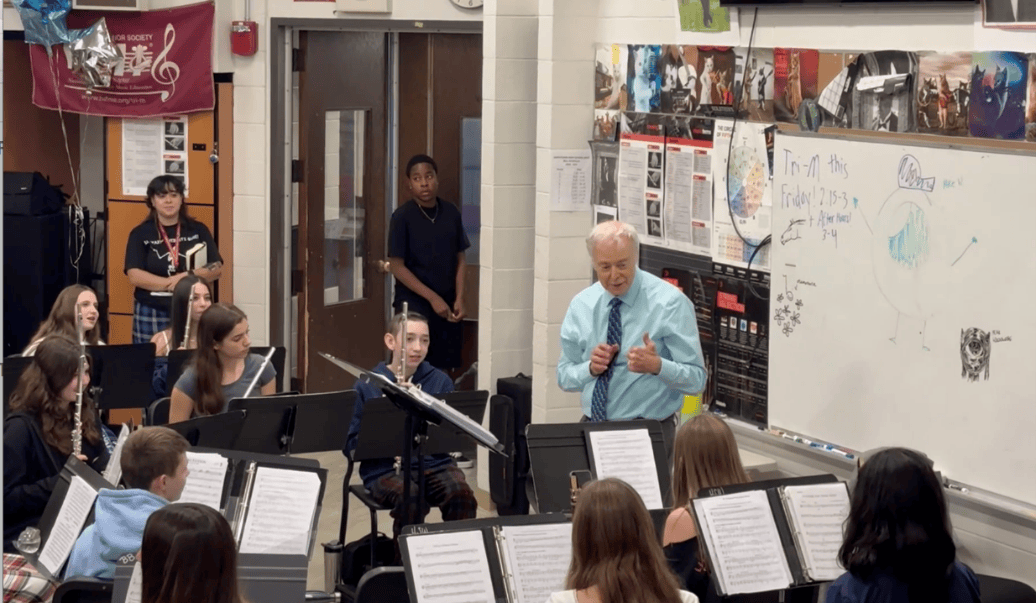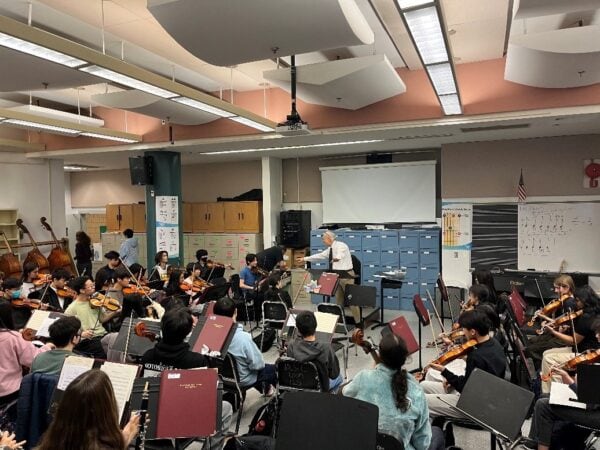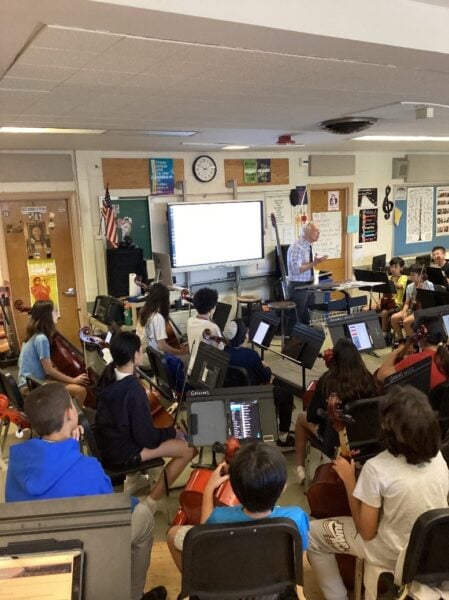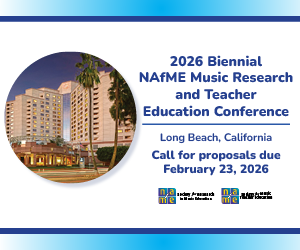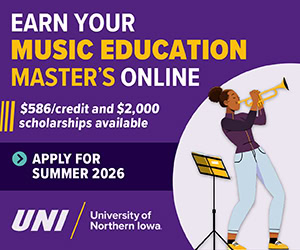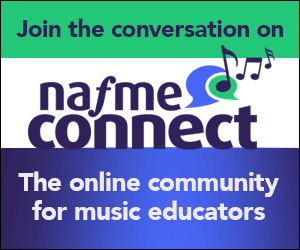/ News Posts / You Can’t Buy That
You Can’t Buy That
How Invaluable Music Education Is
By NAfME Member Joseph Rutkowski
Three years after teaching high school band and orchestra classes for 39 years, I found a stunning example of motivation. Since all those years of teaching the same students for four straight years, motivation was never a huge problem, because the students knew me well enough and I knew them. But since I retired, I have been fortunate enough to have former colleagues invite me to guest teach their large ensemble classes. In the first appearance I made in each new setting, the students challenged my leadership by using their strategies meant for a substitute teacher: continuing to play their instruments or starting a conversation with their stand partner when I gave a cut off. (That’s their job, right?)
My newly invented motivation:
I search for one of the students who is sitting in the “rest position” not talking and not playing—just watching the conductor for the next comment or downbeat. I point to them and exclaim “YOU are a PROFESSIONAL!” That gets their attention. When the room becomes quiet, I ask the class, “Why are they a professional?” Correct responses include “They’re not talking,” “They’re not playing,” and “They are looking at the teacher.”
I explain that a professional musician never wants to waste their energy in a rehearsal when the conductor cuts them off because the musician is getting paid whether they are playing or not. Why waste my chops, the pro thinks to themself.
Inevitably, there is always someone in the room who calls out, “Yeah, but we’re not getting paid.”
My retort is: “Oh, yes, you are. You are getting something you can’t buy: the unique experience of playing your instrument with 40 other musicians for 45 minutes. You cannot put a price tag on the daily experience you get in the chorus room, band room, or orchestra class every single day.”
Let’s face it: Whether you are a band teacher (or choir or string teacher) or a student in one of those classes, there will be plenty of days when the ordinary frustrations of the daily grind of challenges and issues make teaching or paying attention to the teacher get you into a surly mood.
That’s when it is important to remember that you are in a very unique situation that is too often taken for granted.
You, the teacher, should call to mind that everything you do has so much more influence over every one of your students than you realize—positive and negative! One of my favorite principals claimed that we underestimate our influence on our students—TENFOLD.
I tell the students:
“You might be having a hard day—bad grade on an exam or an argument with your best friend. You have the opportunity to distract yourself from your reality and imagine that you’re making sounds with your classmates that stir the emotions and intellect of an audience. Yes, there IS an audience in every rehearsal you play—even if it’s just one person passing by in the hall or someone parking their car outside the window. How often do you find yourself passing by the music room when you hear another ensemble rehearsing or, better yet, someone practicing?
“With all the music we have around us in this world, a tremendous amount of it (perhaps over 90%) is pre-recorded. 120 years ago, the only music you could hear was LIVE music. And now the only time you hear live music is when you are playing your instrument in school, practicing it at home or playing concerts . . . unless you go to a concert. Raise your hand if you have gone to a concert in the last 24 hours [usually no hands are raised] . . . how about in the past week [maybe one or two hands] . . . the past month [maybe a few more] . . . the past year? See what I mean?”
Now that I am free from the obligations and time constraints of being a full-time teacher, I am realizing what a paradise I had and what all students have in the daily performance class. While not all U.S. high schools offer this opportunity to students and music educators, many U.S. school districts actually do. There are also many other countries that provide this possibility.
- Japan has a sturdy school band movement.
- Many schools in European countries, as well as Latin America and South America, South and Southeast Asia, and the Commonwealth, have military-style marching.
If you are fortunate to be teaching music in a public school that includes regularly scheduled performance classes, I urge you to treasure those 40 or so minutes that your students are creating live music for each other—and everyone else who passes by your room.
It’s something that I really miss in my retirement.
Smithtown Orchestra period 3 Beethoven

Stuyvesant High School Warmup with 9th graders and Symphony Orchestra

About the author:
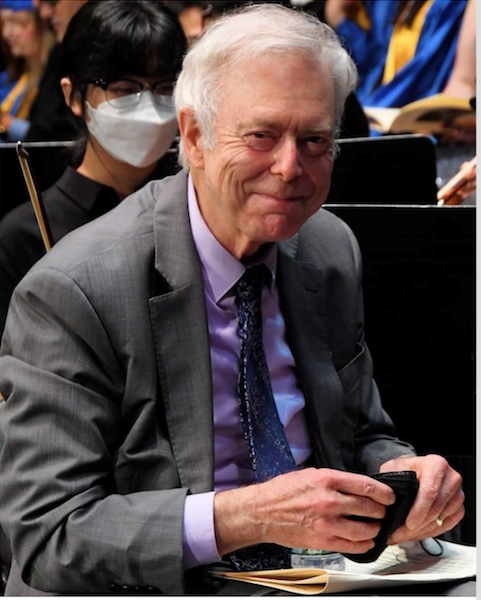 NAfME retired member Joseph Rutkowski taught band and orchestra classes at the John L. Miller-Great Neck North High School on Long Island from 1991 to 2022 and was the orchestra director at Stuyvesant High School in NYC for the eight years prior. He continues to perform as a concert clarinetist in orchestras and chamber ensembles, as well as a jazz pianist with his sons and former students. Joseph is a two-time Presidential Scholar Teacher, a Distinguished Teacher of the Harvard Club of Long Island, the 2015 Long Island Music Hall of Fame Educator of Note, and a three-time GRAMMY Music Educator AwardTM quarterfinalist.
NAfME retired member Joseph Rutkowski taught band and orchestra classes at the John L. Miller-Great Neck North High School on Long Island from 1991 to 2022 and was the orchestra director at Stuyvesant High School in NYC for the eight years prior. He continues to perform as a concert clarinetist in orchestras and chamber ensembles, as well as a jazz pianist with his sons and former students. Joseph is a two-time Presidential Scholar Teacher, a Distinguished Teacher of the Harvard Club of Long Island, the 2015 Long Island Music Hall of Fame Educator of Note, and a three-time GRAMMY Music Educator AwardTM quarterfinalist.
Did this blog spur new ideas for your music program? Share them on Connect! Interested in reprinting this article? Please review the reprint guidelines.
The National Association for Music Education (NAfME) provides a number of forums for the sharing of information and opinion, including blogs and postings on our website, articles and columns in our magazines and journals, and postings to our Connect member portal. Unless specifically noted, the views expressed in these media do not necessarily represent the policy or views of the Association, its officers, or its employees.
Published Date
September 25, 2025
Category
- Classroom Management
- Ensembles
- Lifelong Learning
Copyright
September 25, 2025. © National Association for Music Education (NAfME.org)
